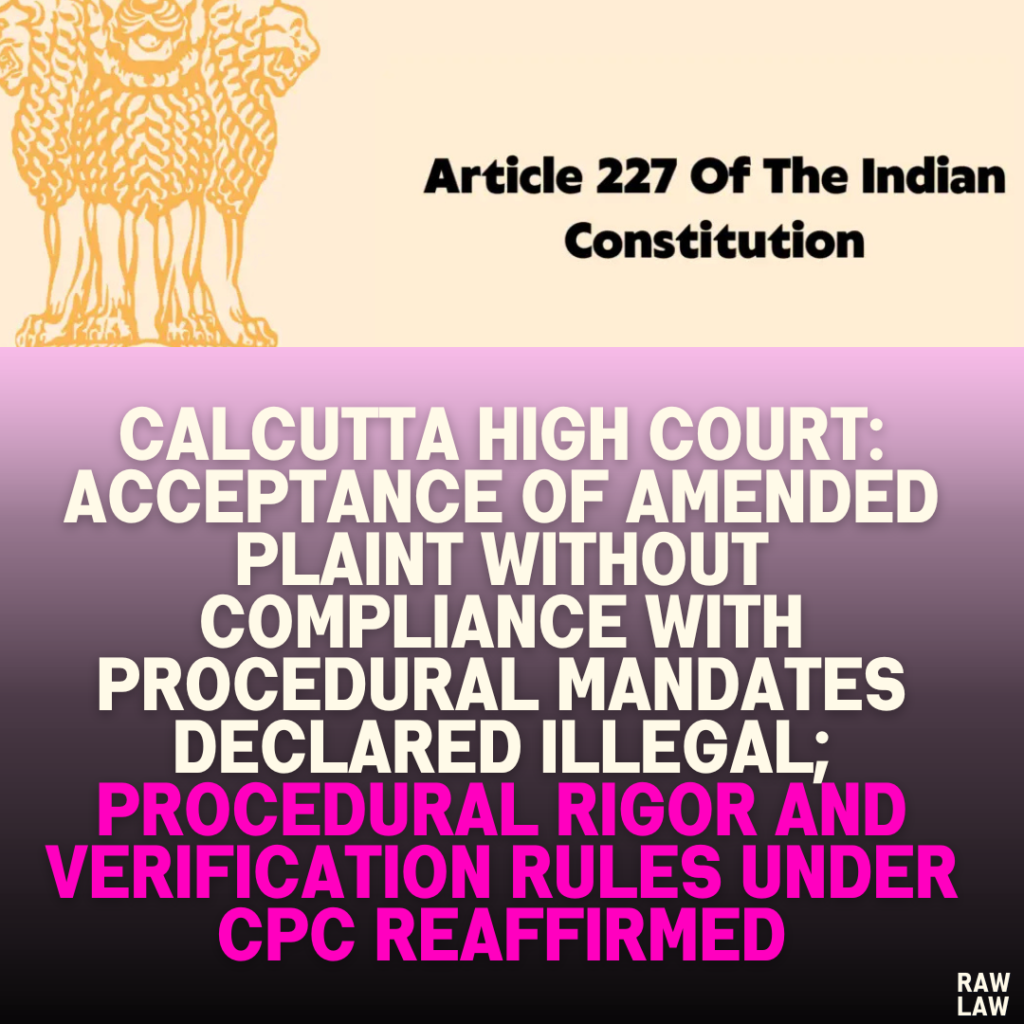Court’s Decision:
The High Court of Calcutta, invoking its power of superintendence under Article 227 of the Constitution, held that the Trial Court erred in accepting an amended plaint filed without following the procedural requirements mandated by the Code of Civil Procedure (CPC). It quashed the Trial Court’s order and directed the expeditious disposal of the long-pending Title Suit No. 123 of 2000 within six months.
Detailed Breakdown
Facts:
- Initiation of the Suit:
- The suit (Title Suit No. 123 of 2000) was filed by the plaintiff seeking a declaration of title and consequential reliefs.
- Alongside the suit, the plaintiff filed an injunction application under Order 39 Rule 1 & 2 CPC.
- Proceedings in Trial Court:
- Initially, the Trial Court directed the parties to maintain the status quo regarding the subject property.
- This order was challenged by the defendants, and the Appellate Court modified it, restraining specific parties from disturbing the defendants’ possession until final disposal of the suit.
- Amendment Application:
- On July 31, 2012, the plaintiff sought to amend the plaint, introducing new claims about their predecessors not being part of an earlier partition suit.
- The Trial Court granted leave for amendment on November 14, 2014, with a cost of ₹200.
- Filing of the Amended Plaint:
- The plaintiff filed the amended plaint after a delay of eight months, without a formal application for an extension or verification as required under CPC.
- Trial Court’s Order:
- The Trial Court accepted the amended plaint, citing the prolonged pendency of the case, and dismissed the petitioner’s application under Order 6 Rule 18 CPC challenging the delayed and unverified amendment.
Issues:
- Procedural Compliance:
- Could the amended plaint, filed beyond the stipulated time without a formal application for an extension, be accepted under Order 6 Rule 18 CPC?
- Verification:
- Was the lack of verification of the amended plaint, as required by Order 6 Rule 15A CPC, fatal to its admissibility?
Petitioner’s Arguments:
- The petitioner argued that the plaintiff failed to file the amended plaint within 14 days of the court order, as mandated by Order 6 Rule 18 CPC.
- The amended plaint lacked proper verification, making it inadmissible under Order 6 Rule 15A CPC.
- The Trial Court erred in accepting the amended plaint solely on the grounds of pendency, ignoring mandatory procedural requirements.
Respondent’s Arguments:
The respondents did not appear during the proceedings, and no arguments were advanced on their behalf.
Analysis of the Law:
- Order 6 Rule 18 CPC:
- It mandates that any party granted leave to amend pleadings must do so within the specified time, or within 14 days if no time is fixed.
- Non-compliance invalidates the amendment unless the court formally extends the deadline upon an application.
- Order 6 Rule 15A CPC:
- All pleadings in commercial disputes must be verified through a Statement of Truth, and any amendments must also be verified.
- Without proper verification, the pleadings are inadmissible and cannot be relied upon in evidence.
- Section 148 CPC:
- The court has the discretion to extend procedural deadlines, even after the expiration of the original period, provided a justified reason is demonstrated.
Precedent Analysis:
- Courts have repeatedly emphasized the importance of procedural compliance to uphold the integrity of judicial processes.
- Amendments to pleadings are not a matter of right and must strictly adhere to procedural rules to prevent abuse of process.
Court’s Reasoning:
- Non-Compliance with Order 6 Rule 18 CPC:
- The plaintiff failed to file the amended plaint within the prescribed period and did not seek a formal extension.
- The Trial Court’s acceptance of the amendment solely on the grounds of pendency disregarded mandatory procedural requirements, rendering the order unsustainable in law.
- Lack of Verification:
- Order 6 Rule 15A CPC requires verification of amended pleadings by a Statement of Truth, which ensures authenticity and accountability.
- The absence of verification in the amended plaint violated the rule, making the document unreliable and inadmissible.
- Improper Judicial Exercise:
- The Trial Court’s decision to prioritize pendency over procedural mandates undermined the principles of law and fairness.
Conclusion:
- The High Court allowed the petitioner’s application, quashing the Trial Court’s order.
- It directed the Trial Court to dispose of the suit within six months, emphasizing that no unnecessary adjournments should be granted to either party.
Implications:
- Procedural Rigor: The judgment reaffirms that procedural rules under the CPC are binding and cannot be overlooked, even in cases of prolonged litigation.
- Verification of Pleadings: The decision underscores the necessity of verified pleadings to ensure their evidentiary value.
- Judicial Oversight: The High Court’s intervention highlights its role in correcting judicial errors and maintaining procedural sanctity.
This ruling sets a precedent for strict adherence to procedural laws, balancing judicial efficiency with compliance.
